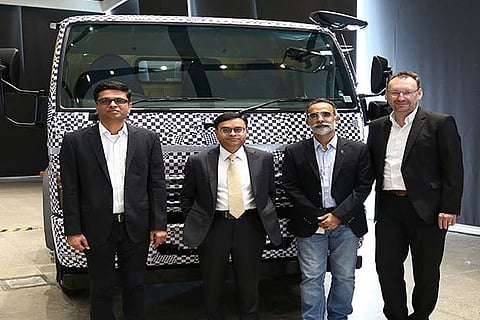

Chennai
On one hand, industry bodies have sought bringing down the rate of GST on vehicles from 28 to 18 pc.
The German MNC on its end, is keen to highlight the need for a comprehensive scrappage policy from the Centre. This also comes at a time when the crisis-hit auto sector is racing to meet the deadline for adhering to the BS-VI emission norms.
On Tuesday, DICV showcased its readiness to transition to the new emission norms of Bharat Stage VI effective from April 2020. Worldwide, Daimler has sold over 1.4 million vehicles with Euro VI technology, an equivalent emissions standard. DICV also received certification for BS-VI in July 2019, proving its relevance for the Indian market. It has invested Rs 500 cr to localise its Euro VI technology for India, completing 2 million km of testing, developing new facilities and over 1,000 new parts, and achieving localisation above 80% on its products.
Satyakam Arya, MD-CEO, DICV, said the tech leap took 12 and 8 years respectively for Japan and Europe, while India achieved the BS-VI transition in three years. “Daimler’s experience of launching Euro VI trucks and buses on the roads means we are ready to transition our BharatBenz trucks and buses to BS-VI by the April 2020 deadline. With this head start, we will begin exporting India-built trucks by 2021/2022.”
“The transition to BS-VI opens up more opportunities to export fully-built vehicles, engines and parts to countries like Mexico, Chile and Brazil that will soon migrate to similar emission norms. This further strengthens India’s position as a global production network for Daimler Trucks and Buses,” he added.
He is quick to point out that scrappage policy and a dependable availability of BS-VI fuel in India would determine the demand and purchase patterns. “Apart from a proper incentive to scrap vehicles, there is a need for authorised scrap centres, with a mechanism to trade in scrap certificates,” Arya said, noting that over 15 lakh trucks compliant with BS-III or earlier emission norms, were still plying in India. He also conceded that GST reduction would only marginally impact growth and sales as a fleet owner’s purchase is based on demand.
BS-VI adoption would also mean an annual reduction in India’s total fuel import to the tune of 780 million litres, he pointed out.
Based on the availability of BS-VI fuel, DICV will officially launch its upgraded range of BS-VI trucks and buses in Q1 of 2020. DICV will begin exporting its OM926 engine series internationally by 2021-22.
DICV would initially pursue new markets such as Mexico, Chile and New Zealand for exports. The DICV Oragadam plant which manufactures the vehicles is the only Daimler location worldwide which produces engines, transmissions, trucks and buses catering to four brands – BharatBenz, FUSO, Mercedes-Benz and Freightliner.
In addition to completing BS-VI testing in varied geographies for BharatBenz Heavy Duty and Medium Duty Trucks, DICV is also gearing up its after-sales network with learnings from other markets. These competencies have been incorporated into training modules at its dealerships, which now spread across India with over 200 customer touchpoints nationwide.
Visit news.dtnext.in to explore our interactive epaper!
Download the DT Next app for more exciting features!
Click here for iOS
Click here for Android